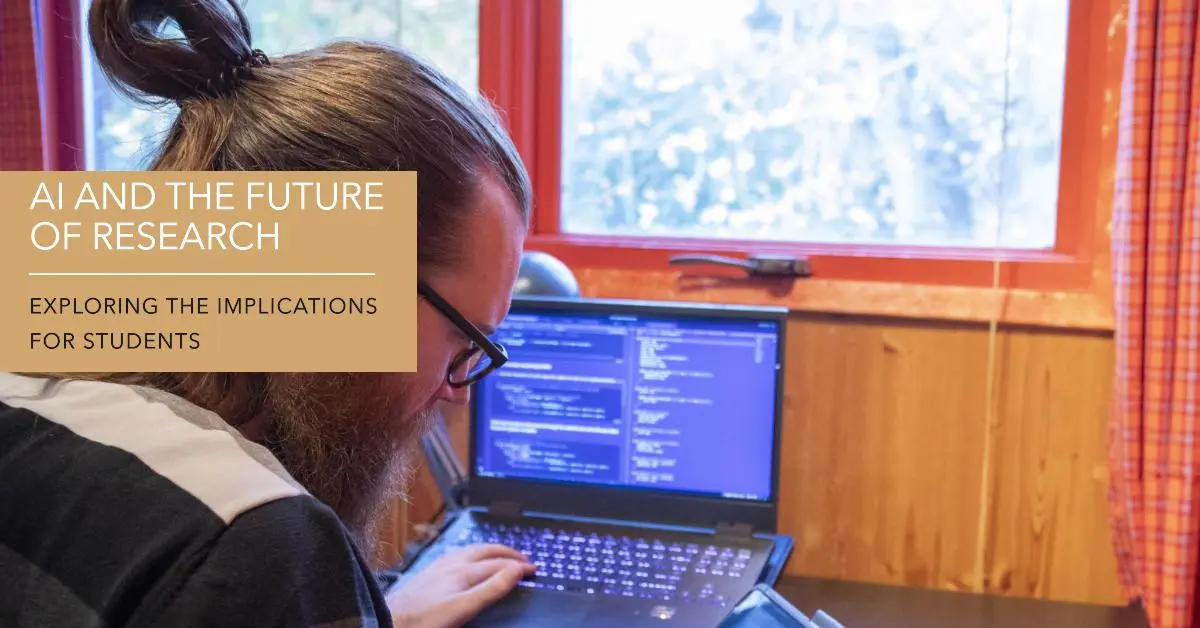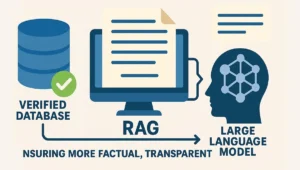Scientific research is a complex and challenging process that requires significant time, financial resources, and effort. Researchers face vast amounts of information, data, and literature, necessitating the analysis, synthesis, and effective communication of their findings. The integration of AI in Research Process holds the potential to streamline, accelerate, and enhance various aspects of scientific research, ultimately transforming the way researchers navigate these complexities.
How can we streamline, accelerate, and enhance the research process? How can we assist researchers in identifying relevant and reliable sources, extracting critical information, and generating new insights and hypotheses?
Enter Artificial Intelligence (AI). AI, a branch of computer science, aims to develop machines or systems capable of performing tasks that typically require human intelligence. AI in research process has already transformed numerous industries, such as healthcare, education, business, and entertainment. It is making significant strides in scientific research, driving innovation and progress.
This article explores the profound impact of AI in research process, spanning from literature review to data analysis and hypothesis testing. Additionally, it highlights the benefits of AI tools in facilitating information discovery and accessibility.
If you’re interested in learning how AI can revolutionize the research process and expedite scientific discoveries, stay with us at researchly until the end of the article.
Table of Contents
AI and Scientific Research Process
Artificial Intelligence (AI) is transforming the field of scientific research, offering novel ways to streamline and enhance various phases of the research process. With its ability to mimic human intelligence and perform complex tasks, AI serves as a valuable tool for researchers.
AI in research: AI can help with many aspects of the research process, including Finding relevant information, Summarizing information, Analyzing data, Generating ideas, Writing, Organizing tasks, Translating text, Simplifying language, and Deconstructing concepts.
One area where AI has made a significant impact is in a literature review. Reviewing existing scientific literature can be time-consuming and overwhelming, as researchers must sift through numerous articles and papers to identify relevant information. AI-powered tools alleviate this burden by efficiently analyzing vast amounts of literature, extracting key information, and providing researchers with a comprehensive overview of current knowledge in their field. This not only saves time but also ensures access to the most relevant and up-to-date information, allowing researchers to build upon existing research and generate new insights.
AI in research process is revolutionizing scientific research by assisting researchers in data analysis and is a critical aspect of AI in research process scientifically. Traditional data analysis methods can be labor-intensive and prone to human error. AI algorithms process large datasets quickly and accurately, identifying patterns, trends, and correlations that may not be readily apparent to human researchers. This empowers researchers to uncover hidden insights and make data-driven decisions with greater confidence while refining their search query parameters for more precise results.
Hypothesis testing is another area where AI can support scientific research. AI algorithms simulate experiments, generate hypotheses, and predict outcomes based on existing data. This not only aids researchers in refining their hypotheses but also provides a cost-effective and time-efficient way to explore different scenarios and test the validity of their assumptions.
To summarize, AI transforms scientific research by offering powerful tools and capabilities that improve the efficiency, speed, and accuracy of various AI in research processes. From literature review to data analysis to hypothesis testing, AI is revolutionizing scientific research and empowering researchers to make substantial advancements, accelerating scientific discoveries.
Future Directions and Implications of AI in Research Process
The integration of AI in research process holds immense potential for advancing scientific discoveries and accelerating the pace of innovation. However, it is crucial to consider the implications and consequences that may arise from improper AI use or lack of understanding. Here are key factors to consider:
- Biased Results: AI models are trained on existing data, which means they can inherit biases present in the data. Researchers who fail to account for these biases or use biased datasets risk producing biased results, perpetuating existing inequalities or misconceptions. It is crucial for researchers to carefully curate and evaluate the data used to train AI in research process models, ensuring fairness and accuracy in their findings.
- Lack of Human Expertise: While AI can automate and streamline various research processes, human expertise and judgment remain indispensable. Overreliance on AI without proper human oversight may lead to erroneous conclusions or misinterpretation of results. Researchers should view AI as a tool to augment their capabilities rather than replace human expertise.
- Ethical Considerations: The use of AI in research process raises ethical considerations that need to be addressed. Researchers must ensure the privacy and confidentiality of data used in AI models, obtain informed consent from participants, and adhere to ethical guidelines and regulations. Failure to address these ethical considerations can undermine the integrity of the research and potentially harm individuals or communities involved.
- Reproducibility and Transparency: AI models can be complex and opaque, making it challenging to reproduce or understand the decision-making process behind their outputs. Researchers should strive for transparency by documenting and sharing the methodology, data sources, and model architecture used in their AI-powered research. This promotes reproducibility, fosters collaboration, and allows for critical evaluation of the research findings.
- Impact on Research Culture: The integration of AI in research process may require researchers to adapt their skills and workflows. It is essential to foster a culture that embraces AI as a tool for innovation and collaboration, rather than a threat to traditional research practices. Researchers should be encouraged to continuously learn and update their skills to effectively leverage AI in their work.
Case studies and real-world applications of AI in Research Process
These are some examples to understand AI’s potential in scientific research while offering practical insights and resources for researchers seeking to leverage AI in their work:
- AI tools and technologies: AI offers a plethora of tools and technologies for researchers to leverage, such as machine learning algorithms, natural language processing tools, and data visualization platforms. By incorporating these advanced AI tools into their research, scientists can uncover hidden patterns, extract valuable insights from complex data, and make more informed decisions.
- AI and interdisciplinary research: AI has the potential to break down silos between research disciplines and encourage cross-disciplinary collaboration. By combining AI expertise with domain-specific knowledge, researchers can develop innovative solutions to complex problems that span multiple fields, paving the way for groundbreaking discoveries and scientific advancements.
- Educational resources and training programs: As AI continues to evolve, researchers must stay current with the latest advancements and best practices. Numerous educational resources and training programs are available, such as online courses, workshops, or professional certifications. By investing in their AI knowledge and skills, researchers can harness the full potential of AI in their work and contribute to groundbreaking discoveries.
Challenges, Opportunities, and the Road Ahead
While AI in research process offers immense potential, challenges and limitations must be considered. Data quality, interpretability, and ethical concerns require careful attention. However, advancements in AI algorithms, integration with other technologies, and the establishment of ethical guidelines hold promise for the future. Researchers and institutions should invest in AI in research process to accelerate scientific discovery and address global challenges.
Conclusion
In conclusion, while AI offers immense potential for advancing scientific research, researchers must be aware of the implications and consequences of its use. By addressing biases, maintaining human expertise, considering ethical considerations, promoting transparency, and fostering a supportive research culture, researchers can harness the power of AI responsibly and maximize its benefits for the advancement of knowledge.
With the integration of AI in research process, the possibilities for scientific discoveries and accelerated innovation are vast. As researchers embrace this powerful tool, understanding its potential implications and taking the necessary steps to use it responsibly will be key to unlocking its full potential.
By carefully curating datasets, combining AI with human expertise, addressing ethical considerations, promoting transparency, and fostering a supportive research culture, researchers can pave the way for groundbreaking advancements in their respective fields.
As we look toward the future of AI in Research Process, the opportunities for collaboration and innovation are endless. Embracing AI as a tool to augment human capabilities will empower researchers to overcome the challenges of the research process, uncover hidden insights, and drive scientific progress forward.
AI in research process is reshaping the scientific landscape, offering unprecedented opportunities for discovery and innovation. By understanding the intricacies of AI in research process and leveraging its potential responsibly, researchers can contribute to a future where scientific advancements are driven by collaboration, efficiency, and ethical considerations.
Resources:
- Nature AI – A collection of AI-related research articles and news published in Nature, a prominent scientific journal. https://www.nature.com/nature-research-ai
- MIT Technology Review – AI – A platform covering the latest news, insights, and research on AI. https://www.technologyreview.com/artificial-intelligence/
- AI Trends – A website providing articles, interviews, and resources on the impact of AI across various industries and sectors. https://www.aitrends.com/
- Analytics Insight – A magazine featuring AI, data science, and emerging technologies with a focus on the latest trends and research. https://www.analyticsinsight.net/
FAQ
Can AI be used for scientific research?
AI tools are increasingly integrated into scientific practices, with many researchers envisioning their central role in research, according to a Nature survey encompassing over 1,600 global researchers.
How can AI be used in research?
Researchers can use AI tools for writing a research grant, a book, or even academic journal articles. There are also some AI-powered tools that can help researchers to edit their articles and use grammatically correct English. Analyzing data from the experiments conducted is an important aspect of research.
How AI is transforming scientific research?
Generative-AI tools powered by large language models (LLMs), notably ChatGPT, help researchers whose first language is not English, but who need to use English to publish their research. Scientists can use LLMs to improve their writing style and grammar, and to translate and summarize other people’s work.
Can I use ChatGPT for academic research?
ChatGPT is often thought of as a tool that will replace human work on tasks such as writing papers for students or professionals. But ChatGPT can also be used to support human work, and research is an excellent example.
Can AI write a scientific paper?
Although academic writing isn’t easy, scientific writing tools for researchers powered by artificial intelligence and machine learning are transforming the experience.








